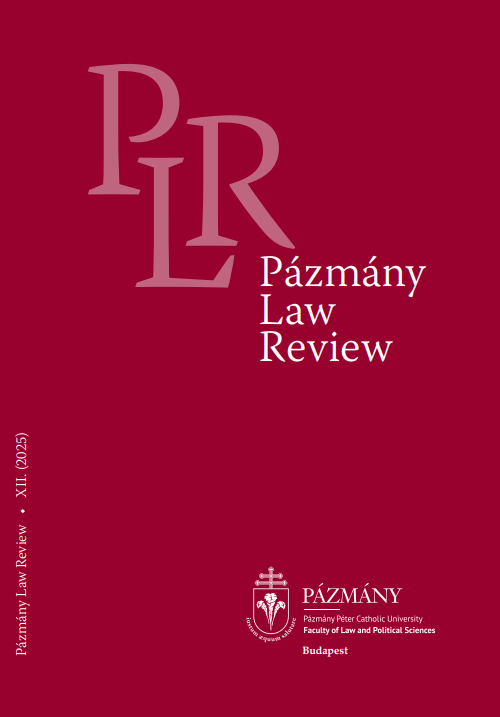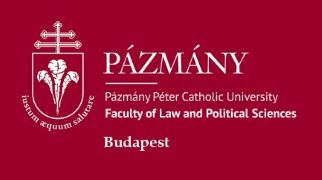Classical Law in the Nation-State versus “Law without a State in the European Union
Abstract
The study compares the legal-theoretical foundations of classical rule of law with the specific institutional system of EU law — a supranational community without a state. The sections devoted to the five thematic units are conceived in a legal-dogmatic manner. The first one summarizes the influence of the humanities based on Helmuth Coing’s monograph. The contradictions between the universal, perfect order of classical natural law and the “fault lines” of contemporary society; the modern thesis: the legal order is more fundamental than privatization (Milton Friedman’s thesis); an outline of the problems of EU law, all these highlight legal-dogmatic issues to be resolved as soon as possible. A clearer designation EU competences hold must be distinguished from those of the Member States. Taking a stance is likewise a must in questions such as “the unconscious aspect of lawmaking by the law-applier” [Hayek contra Kelsen / in the Court of Justice of the EU]. As for the European legal sphere, a union of national constitutional courts could be the ultimate guarantor for overcoming the anomalies of the postmodern rule of law.
References
Ármin von Bogdándy: A nemzeti jogtudomány az európai jogi térségben. [Die nationale Rechtswissenschaft im europäischen Rechtsraum]. Ármin von Bogdándy: A nemzeti jogtudomány az európai jogi térségben – Kiáltvány. Magyar Jog 59, 4. (2012), 248–255.
Armin von Bogdandy – Christoph Grabenwarter – Peter M. Huber: Handbuch Jus Publicum Europaeum Band VI. Verfassungsgerichtsbarkeit in Europa: Institutionen. Heidelberg: C.F. Müller (im Weiteren: Handbuch VI.) 2016.
Helmut Coing: A jogfilozófia alapjai. [Grundzüge der Rechtsphilosophie]. [Übersetzt von Szabó Béla]. Budapest, Osiris Kiadó, 1996.
Lajos Gecsényi – Máthé Gábor (ed.): Sub clausula 1989. Dokumentumok a politikai rendszerváltás történetéhez – A Grand Strategy. [Sub clausula 1989. Dokumente zur Geschichte des politischen Systemwechsels. Die Grand Strategy]. Budapest, Magyar Közlöny Lapkiadó, 2009.
Samuel P. Huntington: A civilizációk összecsapása és a világrend átalakulása. [The Clash of Civilizations and the Remaking of Word Order]. Budapest, Európa Könyvkiadó Kft., 2005.
Norbert Kiss – Gábor Máthé (ed.): Az Európai Államok Evoluciója – Államszervezési paradigmák. [Die Entwicklung der europäischen Staaten – Paradigmen der Staatsorganisation]. Budapest, Ludovika Egyetemi Kiadó, 2024.
Gábor Máthé et al.: Closing remarks. Panel Meeting of the 5th European Jurists Forum 1–3. October 2009, Budapest. Budapest, Magyar Jogászegylet, 2009.
Gábor Máthé (ed.): Die Entwicklung der Verfassung und des Rechts in Ungarn. Budapest, Dialog Campus, 2017.
Gábor Máthé: A posztmodern jogállam. [Der postmoderne Rechtsstaat]. Polgári Szemle: gazdasági és társadalmi folyóirat 15, 1–3. (2019), 193–203.
Gábor Máthé (ed.): 匈牙利宪法与法律的演变与发展. [Xiongyáli xianfa yu falu de yanbian yu fazhan]. [Die Entwicklung der Verfassung und des Rechts in Ungarn]. Budapest, Ludovika Egyetemi Kiadó, 2020.
Vilmos Peschka: Appendix „A jog sajátosságához”. [Appendix. Zur Eigenart des Rechts]. In: Vanda Lamm (ed.): Jog és államtudomány 1. Budapest, Közgazdaságtani és Jogi Könyvkiadó Rt. MTA Állam- és Jogtudományi Intézet, 1992. 25.
Péter Takács: Államtan. Írások a XX. századi általános államtudomány köréből Appendix. [Staatslehre. Schriften aus dem Bereich der allgemeinen Staatswissenschaft des 20. Jahrhunderts. Appendix]. III. Budapest, Szent István Társulat, 2003.





